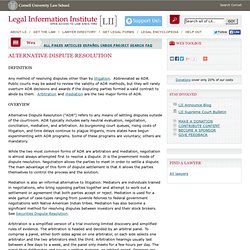

Online dispute resolution. ODR is a branch of dispute resolution which uses technology to facilitate the resolution of disputes between parties.

It primarily involves negotiation, mediation or arbitration, or a combination of all three. In this respect it is often seen as being the online equivalent of alternative dispute resolution (ADR).[1] However, ODR can also augment these traditional means of resolving disputes by applying innovative techniques and online technologies to the process. ODR is a wide field, which may be applied to a range of disputes; from interpersonal disputes including consumer to consumer disputes (C2C) or marital separation; to court disputes and interstate conflicts.[2] It is believed that efficient mechanisms to resolve online disputes will impact in the development of e-commerce. Defining ODR[edit] In ODR, the information management is not only carried out by physical persons but also by computers and software. Alternative definitions[edit] ODR methods[edit] Consensual[edit] SquareTrade.
Linguistic Dispute: Perversion of Online Arbitration Concept in Ukraine. Actually there is no Ukrainian practice of online arbitration.

However, I have already heard “well grounded” opinions of specialists in arbitration concerning online ADR and its future in Ukraine. 5 Reasons Why Mediation Is not Developed in Ukraine. There are certain reasons mostly psychological to explain that situation. 1.

“Two Ukrainian have three hetmans (leaders) among them”, this saying illustrates the historic ambition of Ukrainians to rule and reign. Alternative Dispute Resolution in China. More and more disputes between traders are determined by arbitration institutions.

Arbitration provides several advantages, like the possibility to adapt the proceedings to the parties’ convenience in terms of location, language, and choice of arbitrators. Moreover, it is cost-efficient (only one judicial instance has to be passed, and it is final and binding for the parties); and the cross-border enforceability of arbitration awards tends to be higher than court judgments. China is required to recognize and enforce foreign arbitral awards in accordance with the “New York Convention on the Recognition and Enforcement of Foreign Arbitral Awards” of 1958, which it ratified in 1987. Drafting a legitimate and effective arbitration clause will avoid misunderstanding between the parties and the risk of initiating, in front of a PRC Court, a proceeding regarding the validity of the arbitration agreement. Where to Arbitrate? Off the Peg or Tailor-made? ICAC Russia: Enforcement of the Decisions. Russian Federation participates in the Convention on the Recognition and Enforcement of Foreign Arbitral Awards (done at New York, on 10 June 1958).

Moreover, the Law of the Russian Federation, On International Commercial Arbitration, No. 5338-1, which is based on the Model Law on International Commercial Arbitration adopted by the United Nations Commission on International Trade Law (UNCITRAL), was adopted in Russia on the 7th of July 1993. For that reason awards rendered by the ICAC of the Chamber of Trade and Industry of the RF cannot be reviewed on their merits by the state courts of Russia. An arbitral award may be set aside by the court only on the grounds, which are listed in Art. 34 of the above Law. The same grounds are provided by Art. 34 of the UNCITRAL Model Law. What Is International Mediation? Alternative Dispute Resolution Law - Guide to Alternative Dispute Resolution ADR. What is Alternative Dispute Resolution (ADR)?

ADR is a term used to describe several different methods of resolving legal disputes without going to court. The rising cost of litigation is making traditional lawsuits impractical for many individuals and businesses. At the same time, civil courts face backlogged dockets, resulting in delays of a year or more for private parties to have their cases heard by a jury. New types of proceedings have been developed in response, and they are proving beneficial, saving time and money for everyone involved. These include arbitration, mediation, and additional kinds of ADR designed for specific cases and subject matters. What Is Cultural Mediation? Alternative dispute resolution. Alternative dispute resolution (ADR) (also known as external dispute resolution in some countries, such as Australia[1]) includes dispute resolution processes and techniques that act as a means for disagreeing parties to come to an agreement short of litigation.

It is a collective term for the ways that parties can settle disputes, with (or without) the help of a third party. Despite historic resistance to ADR by many popular parties and their advocates, ADR has gained widespread acceptance among both the general public and the legal profession in recent years. In fact, some courts now require some parties to resort to ADR of some type, usually mediation, before permitting the parties' cases to be tried (indeed the European Mediation Directive (2008) expressly contemplates so-called "compulsory" mediation; this means that attendance is compulsory, not that settlement must be reached through mediation).
Salient features[edit] ADR traditions vary somewhat by country and culture. Alternative Dispute Resolution. Definition Any method of resolving disputes other than by litigation.

Abbreviated as ADR. Public courts may be asked to review the validity of ADR methods, but they will rarely overturn ADR decisions and awards if the disputing parties formed a valid contract to abide by them. International. Conflict Resolution Blogs. Conflict Resolution Blogs. Energy Disputes and International Arbitration - Turkey. I.

Introduction Several rapid, transparent and new legal resolution mechanisms are generated as an alternative to governmental adjudication since legal relations in social and commercial life necessitates resolutions which are becoming increasingly complicated and for which technical expertise is needed. One of the most frequently used components of this mechanism called “Alternative Dispute Resolutions” is arbitration.
In the most common terms, arbitration is defined as a mechanism that foresees to settle disputes, which are or to be arisen between the parties in a legal relationship, by arbitrator(s) who are assigned by the parties, instead of resolving the disputes through governmental adjudication. II. As it is generally known, energy sector has a highly technical, capital-intensive and complicated composition in its nature. In addition, investments in the energy sector are generally made as investments of multinational companies in developing or underdeveloped countries. III. IV.